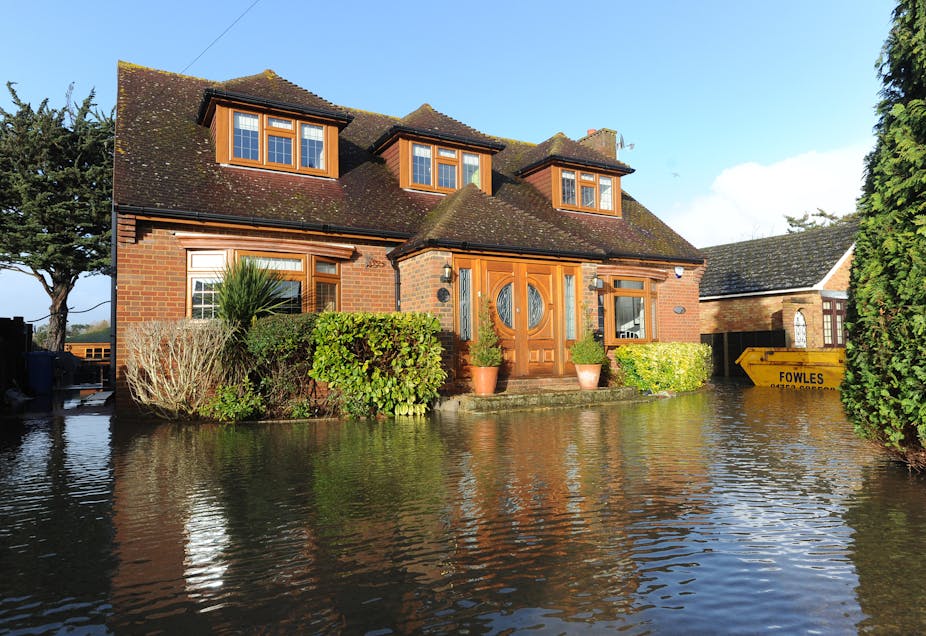This winter’s floods were amongst the most severe in living memory, with swathes of the country submerged. The loss of life has been much lower than for many disasters around the world, but many land owners have suffered substantial damage to their homes and property. Government policy is often unable to save or even help everyone affected and so difficult decisions have to be made over who to save.
When explaining the allocation of resources for land protection, the chair of the Environment Agency Lord Smith presented the choices facing the government as a stark dichotomy. He stated that we were confronted with a “difficult choice”, which “involves tricky issues of policy and priority: town or country, front rooms or farmland?” He went on:
There’s no bottomless purse, and we need to make difficult but sensible choices about where and what we try to protect.
Presented in this way, the government appear to face a classic moral dilemma. One thought experiment, “The Speluncian Explorers”, describes a group of explorers trapped in a cave who have to choose between the consumption of one of their party, or the certain starvation of them all. We are fortunate that few natural disasters are likely to present us with such an unpalatable choice, but as floodwater flows towards a populated area, are we justified in diverting it to farmland or less heavily settled villages?
Winners and losers
If we accept that it is the role of the government to protect property rights, we must examine why some rights are protected at the expense of others. National infrastructure developments such as HS2, motorways and the national grid have all yielded winners and losers. Many benefit, but others have their property rights removed as a matter of political expediency. From a property perspective, planning and environmental laws are all statutes of compromise which attempt to balance competing interests.
When flood defences are built, policymakers must decide which land should be prioritised. Much has been made of the government’s cost-benefit analysis of flood protection and the shortfall after Environment Agency budget cuts. This analysis included a number of factors and prioritised the protection of the homes of the less well-off and elderly – presumably to ensure that the cost of repair and disruption fell on the broadest shoulders.
Determining value
Newspapers frequently report on flood damage running well into the millions of pounds, but financial calculations alone are a poor indicator of the real value of property, either to the individual or to society as a whole. Economic value is often bested by sentimental attachment, and certain types of property, including land, can be part of a person’s identity. With farmland, it is possible that the land could have been in a family for generations – loss of it may feel like a severe amputation.
The choice becomes even more complicated when governments have to consider sentimental attachment to property on a regional or national scale, as no valuation of public land can be entirely divorced from its value to society as a whole. The furore that ensued after the government published plans to sell Forestry Commission land demonstrates that the less tangible values associated with public land should be a significant factor in the creation of public policy.
Rural land can be valued according to its agricultural productivity, but even the market value of land is governed by a number of disparate factors. This land can also be used for other purposes, including the many parks and footpaths that are enjoyed by walkers and other visitors.
Multiplier effects have been used to value amenity trees in cities such as London. Is a tree that is visited and admired by many thousands of people every day of greater value than one which is lost amongst a forest of its peers? The forestry commission believes that it is. Applying this rule places a higher value on more populous areas and on more visited attractions, but taken on its own does not measure the environmental value of land that is a habitat for rare flora and fauna.
Difficult decisions
If a government is forced to make a choice between property winners and losers, no attempt to balance property rights will satisfy every party because of the subjective nature of property values. The law can compensate injured parties, but there are some values attached to property that make this irreplaceable in financial terms.
Where land and resources are limited there is a long history of the prioritisation of land use. Although many people connect their identity to personal attachments to land, the foundation of rights in real property is one where the owners’ rights have never been absolute. This gives legislators significant power over a commodity that is of great financial and sentimental value. We can only hope that this power is exercised carefully and responsibly.

